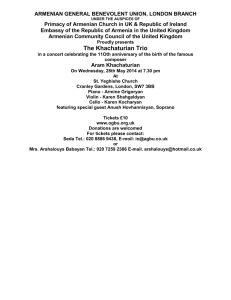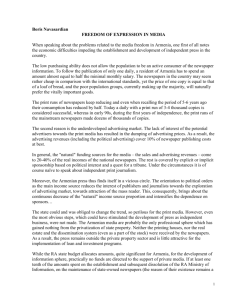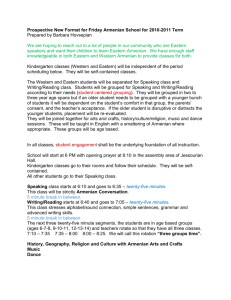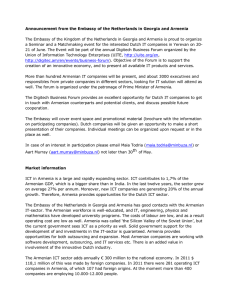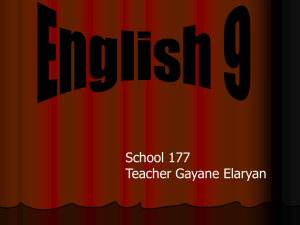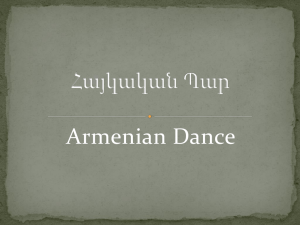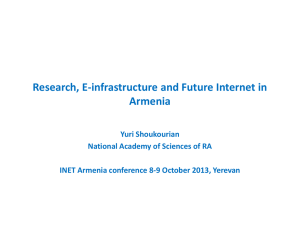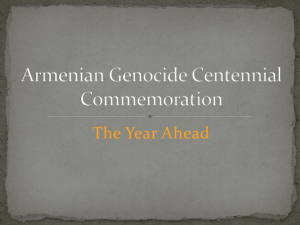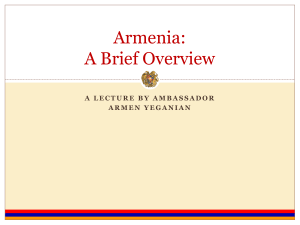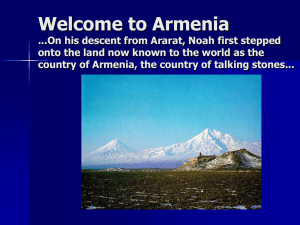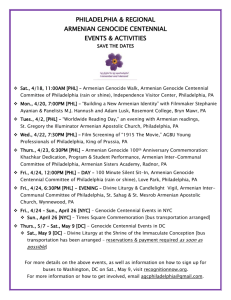summary report
advertisement
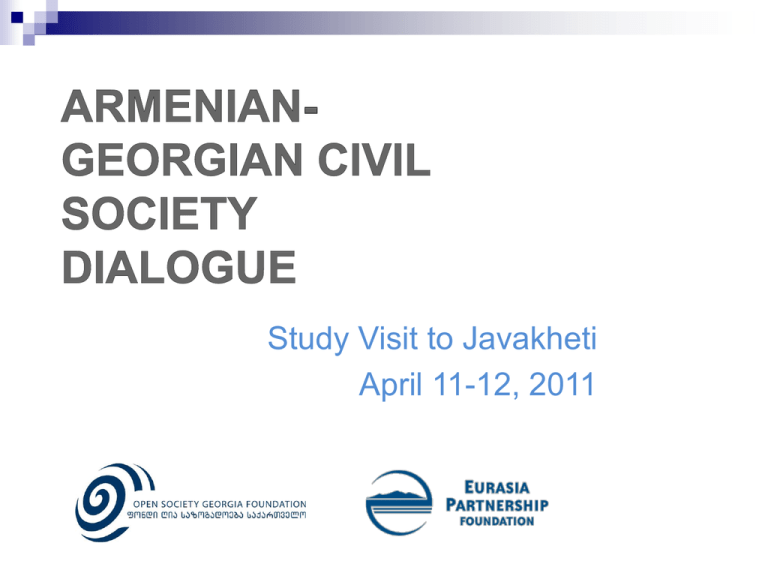
Study Visit to Javakheti April 11-12, 2011 International infrastructural projects: Baku-Tbilisi-Kars railroad Kartsakhi natural reserve (Supported by German Government) Road construction (Millenium Challenge Corporation) State infrastructural projects: Road construction and rehabilitation Water supplies and sewage systems’ construction and rehabilitation Irrigation systems’ rehabilitation Gasification (State program on 2008-2013) Construction of hydroelectric stations (this spheres has serious potential for development based on the specifics of the landscape) National programs Rural infrastructure development support Agribusiness development program (is a plan for future) School rehabilitation Hospitals’ rehabilitation and construction Challenges: though the government implements policies on development of healthcare system in the region, to attract qualified personnel is a great problem. This is also connected with the fact that the salary of healthcare workers in the region is too low to attract their interest. Gasification is in process apart from the city of Akhalkalaki only 3 villages in the region are provided with gas, as for Ninotsminda both the city and the region are not fully provided with gas. The irrigation system is a major problem for the region as around 75-80% of the arable land is not irrigated and around 30 % of the lands is not worked/cultivated at all. Agricultural sector being the most important for the region needs to be developed particularly in spheres of product processing industry, and potato storing. Municipal projects School rehabilitation by the Ministry of Education and Science (partly from the municipal budgets) Kindergartens Cultural centers Private investments Kindergartens Rehabilitation of cultural heritage monuments Business environment: Legal framework for conducting business had been improved Infrastructural projects provide access to Georgian markets for local goods Local and foreign investments in agriculture and light industry Challenges: Lack of financial resources to stimulate local entrepreneurship Lack of professional skills and absence of centers for professional education Armenian custom and other legislative regulations create obstacles for the import/export of goods to and from Armenia Note: Privatization of the land plots across the region is not implemented yet Migration trends Migration had been reduced External factors: Influence of Georgian-Russian relations Influence of Armenian customs regulations Internal factors: Incentives to conduct economic activities in the region increased Development of infrastructure increased employment opportunities (Many officials of the Local governments and state bodies both in the Akhalkalaki and in the Ninotsminda have graduated from the Kutaisi School of Public Administration after Zurab Zhvania) Seasonal migration had been occurred Investments from Armenia: The tax reform for SMEs in Georgia and negative tax environment in Armenia attract Armenian businessman to invest in Georgia in general and in the region particularly Light industries (Gyumri beer factory to open in Akhalkalaki) Agriculture Trade relations: Livestock Agricultural goods Note: Georgian and Armenian customs regulations are considered to hinder cross-border trade relations for Javakheti communities. Synchronization of tax legislations in context of European integration might solve this issue Implementation of state language programs: Methodology and teaching materials of bilingual education for public schools had been elaborated; National accession exams to the universities are conducted in minority languages. Trainings for local teachers are available at Ministry of Education and Science local Resource Centers; One year state language program for minority students had been launched at the state universities (“4+1” presidential program) Challenges: scarcity of qualified human resources affect overall impact of the government policies on state language. Lack of professionals that can synchronize Georgian and Armenian texts influence the quality of educational material (this can be a field for bilateral cooperation on state and CS levels). The quality of teaching in Armenian is low as there is no control over the quality of education due to the lack of professionals. (ex. There are many mistakes in the exam papers in Armenian, no school Olympiads for Armenian disciplines, etc.) Establishment of Language Houses (Ministry of Education and Science): Various groups of Akhalkalaki and Ninotsminda communities are taught state language courses: Public officials Pupils Students Challenges: due to the scarcity of human resources the Language Houses are not able to provide its services to all interested parties. There is low (although growing) interest from minorities in studying Georgian language. Educational projects led by NGOs: Variety of services (including seminars and vocational trainings) for school teachers are provided Methodologies on bilingual and multilingual education are disseminated Civic education courses are designed and implemented Challenges: NGOs are depended on international donor assistance that is why impact of the projects is defined by regularity of the relevant activities. The local higher educational institutions, both branches of Georgian and Armenian Universities do not have good quality. Public Defender’s Office (PDO) is established in Samtskhe-Javakheti region (Akhalkalaki) Functions of the PDO regional office are as follows: Collection of information on state of Human Rights in the region No appeals to the PDO representative in Akhalakalaki was ever received regarding violations of rights on ethnic ground lection and transmission of the appeals to the Public Defender’s Office in Tbilisi Civic Education (including translation of human rights documents into Armenian) The material on human rights is mainly in Georgian and people do not have the opportunity to receive information in Armenian so that they could know their rights Projects on youth and culture implemented by NGOs: Civic education projects Professional development projects for youth Youth mobilization projects for community development Cultural heritage popularization State programs on youth and culture Construction and rehabilitation of libraries, sports clubs, music and arts schools, cultural centers Support of folk groups Organization of folk festivals Challenges: maintenance of cultural heritage monuments is not a subject of policies of the relevant state institutions. The status of religious organizations other than Georgian-Orthodox church is a legislative issue. The cultural heritage is being reconstructed by means of local communities or those living abroad. TV channels: ATV12 Parvana TV Areg/Javahk TV Newspapers: Southern Gates (bilingual) Vrastan Challenges: underdevelopment of advertising market in the region affect sustainability of the media organizations. Local communities are tended to be more interested in Armenian and Georgian national media rather than local media outlets. No internet media no radio available in the region. Although there are no problems in receiving information from local municipalities, the police is less cooperative. Most part of civil activities in the region are carried out by Tbilisi-based NGOs Most part of local NGOs are providing their services in education (civic education and state language programs) Some local NGOs seem to be proactive in period prior to elections only Cooperation between NGO sector and local government is not well structured Local NGOs have close cooperation with local media organizations The withdrawal of Russian military base from the region is negative for the local population The repopulation of Muslim Meskhetians to the region scares the Armenian population Armenians in Javakheti are separatists and are against integration Armenia is supporting separatist moods in the region These statements are caused by lack of circulation of unmediated and adequate information both with Armenia and with Tbilisi To be worked out together in Tbilisi
